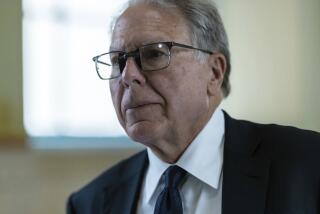NRA chief Wayne LaPierre says he’s resigning days before trial scrutinizing his leadership and spending
- Share via
NEW YORK — The longtime head of the National Rifle Assn. said Friday he is resigning, just days before the start of a civil trial over allegations he diverted millions of dollars from the powerful gun rights organization to pay for personal travel and other lavish perks.
Wayne LaPierre, the executive vice president and chief executive, said his departure is effective Jan. 31. The trial in New York Atty. Gen. Letitia James’ lawsuit against him, the NRA and others who have served as organization executives is scheduled to start Monday. LaPierre and ex-NRA President Oliver North are among the witnesses expected to testify.
LaPierre, 74, has led the NRA’s day-to-day operations since 1991, acting as the face and vehement voice of its gun rights agenda. He once warned of “jack-booted government thugs” seizing guns, called for armed guards in every school after a spate of shootings, and condemned foes backing gun control measures as “opportunists” who “exploit tragedy for gain.”
In recent years though, the NRA has been beset by dwindling membership and financial troubles, along with lingering questions about LaPierre’s leadership and spending. One of LaPierre’s top lieutenants, Andrew Arulanandam, will assume his roles on an interim basis, the organization said.
Phillip Journey, a former NRA board member who is set to testify at the upcoming trial in New York, said LaPierre’s resignation doesn’t resolve the open questions before the court or remedy what he sees as persistent rot within the gun lobbying group. “Honestly, the grifters are a snake with many heads and this is just one,” said Journey, a Kansas judge who’s running to retake a seat on the NRA’s board.
Journey also testified at the NRA’s bankruptcy trial in Texas and said he anticipates there is enough evidence for the New York attorney general to prove her case. “It’s a tragic end to a career that had many high points,” Journey said of LaPierre stepping down. “It’s one of his own making.”
LaPierre has been in charge of the NRA since 1991. Andrew Arulanandam will become the interim CEO and executive vice president, the organization said.
“With pride in all that we have accomplished, I am announcing my resignation from the NRA,” LaPierre said in a statement released by the organization. “I’ve been a card-carrying member of this organization for most of my adult life, and I will never stop supporting the NRA and its fight to defend Second Amendment freedom. My passion for our cause burns as deeply as ever.”
LaPierre is accused in the lawsuit of spending millions on private jet flights and personal security and accepting expensive gifts — such as African safaris and use of a 107-foot yacht — from vendors.
He is also accused of setting himself up with a $17-million contract with the NRA if he were to exit the organization and spending NRA money on travel consultants, luxury car services and private jet flights for himself and his family — including more than $500,000 on eight trips to the Bahamas over a three-year span.
James is seeking to ban LaPierre and the other executives from serving in the leadership of any not-for-profit or charitable organization conducting business in New York, which would effectively remove them from any involvement with the NRA.
Some of the NRA’s excess spending was kept secret, the lawsuit said, under an arrangement with the organization’s former advertising agency, Ackerman McQueen. The advertising firm would pick up the tab for expenses for LaPierre and other NRA executives and then send a lump-sum bill to the organization for “out-of-pocket expenses,” the lawsuit said.
LaPierre, in defending himself, has said in previous testimony that cruising the Bahamas on a yacht was a “security retreat” because he was facing threats after mass shootings. He conceded not reporting the trips on conflict-of-interest forms, testifying: “It’s one of the mistakes I’ve made.”
“He’s been the leading political force of the NRA for over 30 years,” said Robert Spitzer, a political science professor at the State University of New York-Cortland and author of several books on gun politics. “He has been the leading edge of the very sharp political voice of the organization.”
More to Read
Sign up for Essential California
The most important California stories and recommendations in your inbox every morning.
You may occasionally receive promotional content from the Los Angeles Times.













